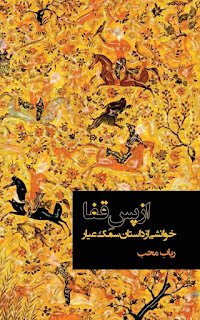Title: Away and beyond –
a study on Samak Ayar
|
عنوان: “از پسِ قفا ـ خوانشی از داستان سمک عیار”
نویسنده: رباب محب
انتشارات آزاد ایران
شابک: 9789176370506
|
|
àz pàse ghàfâ- xâneshi àz Sàmàk Àyâr (Away and beyond – a study on
Sàmàk Àyâr) is the first serious and extensive research ever done on “Sàmàk
Àyâr”. Robab Moheb has studied the tale in detail and examined it from
different perspectives. The concept Ayar and its meaning, the customs and
habits of kings and royal families, fatalism and the belief in destiny,
occultism and superstition, the instruments and rules of war, cultural
rituals and holidays, drinking habits of the people, musical instruments,
marital rules and laws, the position of women, eroticism, the language of
story and its structural forms and literary value are motives brought up in
the study. The final words are a long list of name, holding the names given
in the story “Sàmàk Àyâr”.
“Sàmàk Àyâr” (dated to around the 13:th century) is an oral story which
has traveled from mouth to mouth for centuries. It’s a long prose story in
five volumes and is seen as the first Persian novel, with a large research
value. Existing written volumes signify that several people in different
times and in different places have amassed the story.
The story is told in simple prose, close to the colloquial language,
sometimes adorned with various prosodic techniques (rhythm, rhymed prose e t
c). The sentence structures are simple and clear with a sparse use of implied
meanings. The story abounds with lush descriptions and metaphors, used
primarily in the conventional depictions of beauty, battles, sunrise and
sunset. The verses are used to amplify its message and comments on the
narrative situation. The verses lack references and are therefore very likely
composed by the teller.
The dialogues, as the story itself, is direct speech. The language is
typical for the classic Persian spoken and written before the 14th century
and encompasses a large amount of archaic Persian words which have changed
over time. The changes include semantics as well as grammar and phonology.
Some words are spelled according to the conventional pronunciation (for
instance naqm instead of naqb). From the lexical point of view the text is
therefore very interesting for research.
|
«از پسِ قفا ـ خوانشی از سمک عیار» نخستین پژوهش جدی و گسترده از داستان
سمک عیار است. رباب محب، به داستان از زوایای مختلفی نگاه کرده است. وی با
پرداختن به مضامین و موضوعاتی چون تعریف عیار، موقعیت اجتماعی و سیاسی عیاران،
نگاه انسان سمک عیار به خود و پیرامون خود، بارگاه شاهان، تقدیرگرایی و خرافهپرستی،
آیین جنگها و جنگافزارها، مراسم شرابخواری، ساقیان و آلات موسیقی، جشن نوروز،
آیین ازدواج، جایگاه زن در داستان سمک عیار، زنان درباری و زنان پهلوان، اروتیسم
عیار و زبان و ساختار فکری/ادبی سمک عیار، دست به یک پژوهش همهجانبه و ماندگار
زده است. لیست کامل نامهای آمده در کتاب سمک عیار، پایانبخش این اثر پژوهشی است.
داستان سمک عیار، یک رُمانس ایرانی است. در این داستان زندگی و روابط
عاشقانهی شاهان و شاهزادگان در قالب حکایاتی لابه لایه و بر پایهی نگرشی
عامیانه و مردمی و با زبانی ساده و بیپیرایه بیان میشود. مضاف براین، داستان
سمک عیار اطلاعات جامعی دربارهی سنّت و سیاق عیاری، معیارهای سیاسی و اجتماعی و
فرهنگی ایران در قرون ششم و هفتم به دست میدهد.
داستان سمک عیار، به عنوان یک گنجینهی فرهنگی- ادبی، بخشی از پیشینهی تاریخی، فرهنگی، اجتماعی و سیاسی ما ایرانیان است. رباب محب، با نگاه موشکافانه و تیزبینی پژوهشگرانهاش جایگاه و مقام این داستان را در اثر خود «از پسِ قفا ـ خوانشی از سمک عیار» به خواننده نشان میدهد. |
۱۳۹۴ دی ۷, دوشنبه
«از پسِ قفاـ خوانشی از سمک عیار»
اشتراک در:
نظرات پیام (Atom)

هیچ نظری موجود نیست:
ارسال یک نظر